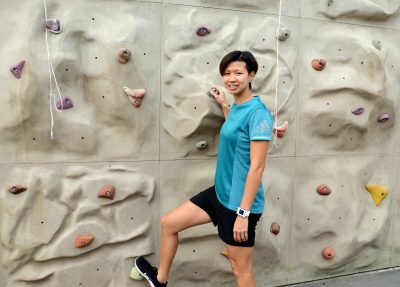Young Children’s Voices in Mathematical Problem Solving
Contributed by Dr Ho Siew Yin and Sng Wei Qin Abbie, from NTUC First Campus, for SingTeach Virtual […]
Read More
Many regard leaders as individuals who can motivate or guide others to achieve positive outcomes. A teacher at Zhenghua Secondary School, however, believes leadership is not only about leading others, but also about moving out of one’s comfort zone. She shares with us how the school’s outdoor education curriculum gives students the space to develop themselves and realize their leadership potential.

Sherlyn has found that getting students involved in the planning stages of outdoor activities can boost interest and engagement.
For Ms Sherlyn Goh, Head of Department (Physical Education) at Zhenghua Secondary School, leadership is not just about one’s competence or the ability to inspire others. Rather, leadership starts with the individual and effective leaders have a growth mindset – striving to go beyond personal limits to achieve the best possible outcomes. Sherlyn believes that this mindset can be cultivated through physical and outdoor education.
“Outdoor education often lends itself to situations that test students’ resilience or call on them to work with their peers. These challenging situations may also compel students to face up to their own fears and expectations,“ says Sherlyn.
Nonetheless, such challenges can be opportunities for students to stretch their potential and grow, as long as they do not shy away from them.
“It is up to students to overcome the challenges they face and make the best of the experience,” Sherlyn adds. “If they attend an adventure camp or outdoor expedition with the mindset that they will tackle challenges head-on and maximize the learning
experience, they will achieve personal growth.”
To give students room for personal growth, Zhenghua Secondary School provides opportunities for them to take ownership of their learning through the school’s signature programme in outdoor education – student-led adventure camps.
“Outdoor education often lends itself to situations that test students’ resilience or call on them to work with their peers – these challenging situations may also compel students to face up to their own fears and expectations.”
– Sherlyn, on how outdoor education offers opportunities for personal growth
A key feature of Zhenghua Secondary School’s outdoor education curriculum is the adventure camps that students plan for and participate in at Secondary 1 and 3. “The school has run both camps for 5 years and does not engage an external service provider to administer the activities,” Sherlyn shares. “In fact, our students plan and conduct these camps while teachers play a facilitative role.”
For the Secondary 1 camp, student leaders from Secondary 2 and 3 plan and administer the activities while juniors play a participatory role. At the Secondary 3 level, students come together to organize and implement their own class expeditions.
Every Secondary 3 student contributes to one aspect of the outdoor expedition and students get to join a committee that is aligned with their respective strengths. While students with outgoing personalities often gravitate towards the route planning or operations committees, others may choose to join the photography or finance committee.
Sherlyn acknowledges that while both teachers and students have to commit more time and effort in order to bring both camps to fruition, the results are rewarding.
“Involving students in the entire process from conceptualization to execution gives them greater ownership over these camps,” explains Sherlyn. “They would also develop a better appreciation of the value of these outdoor education programmes.”
Beyond that, the planning and execution of these camps also gives students the opportunity to take up leadership roles.
Sherlyn believes there are two kinds of leaders that students can be – leaders of peers and leaders of self. The former refers to those who are effective decision-makers and demonstrate the ability to inspire others. The latter concerns those who are resilient and persevere through challenges.
Although many can envision the confident and outgoing student leading a group during
an outdoor expedition, it cannot be presumed that introverted students necessarily lack leadership skills.
“In fact, the quieter students may be the very ones supporting their classmates who struggle to keep up with the group during an outdoor expedition,” Sherlyn shares. “In doing so, they exemplify their ability to lead a peer.”
Furthermore, Sherlyn and her colleagues have also observed that many average students are actually innate leaders. “When faced with a challenging situation during an adventure camp, the leadership qualities of these students can shine through,” Sherlyn explains.
For those already in leadership positions, an outdoor educational experience can help to build up their confidence and strengthen their leadership capabilities.
“I once taught a rather shy student, who was tasked with leading the class outdoor expedition by virtue of being the class chairperson. After the expedition, I noticed that he became a more confident person and his classmates were more receptive to him,” recounts Sherlyn.
“When faced with a challenging situation during an adventure camp, the leadership qualities of these students can shine through.”
– Sherlyn believes that outdoor activities can open up opportunities for some students to exhibit their leadership
Sherlyn’s department has received encouraging feedback from students and witnessed positive student outcomes from the two camps – these motivate them to continue running the outdoor programmes for future cohorts.
Nonetheless, in order for future generations to enjoy the same outdoor experiences, today’s students must understand the importance of protecting outdoor spaces and develop a sense of responsibility for the environment.
“Many children of today are somewhat disconnected from the environment as they spend much of their time indoors and are also preoccupied with their electronic gadgets,” explains Sherlyn. “We hope that outdoor education will help to sensitize students to the environment and foster an appreciation for outdoor sites.”
If today’s students feel a sense of attachment to the environment and are able to lead efforts in protecting outdoor spaces, future cohorts of students will also benefit from the same sites and enjoy fruitful outdoor educational experiences.